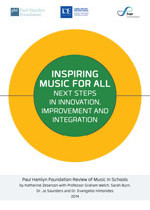Foreword
It is now up to us as a community of practice to take charge of ourselves and ensure that our leadership, our commitment to innovation, and the quality of our work are exemplary. In that way we will release the great potential of our collective resources and ensure the best for all children and young people.
It has been a great privilege to lead this review. I have worked in music for 35 years – in community settings with people of all ages and aspirations, in schools, in Higher Education, as a performer, a trainer and for the last decade a senior leader. I couldn’t therefore approach this task as an outsider – this is my own community of practice, and responsibility for taking the next steps belongs to me just as much as it does to the thousands of colleagues across the country that are working with passion, determination and love every day supporting children and young people in and through the power of music.
So as a participant-observer I have been by turns inspired, infuriated, intrigued, humbled, challenged and uplifted by what I have heard from the contributors and read in the literature. It is certainly the best and the worst of times for music education in England, with opportunities and threats equally balanced. It is now up to us as a community of practice to take charge of ourselves and ensure that our leadership, our commitment to innovation, and the quality of our work are exemplary. In that way we will release the great potential of our collective resources and ensure the best for all children and young people. There is much inspiring work to learn from, and powerful evidence to support the evolution of the National Plan for Music Education as a vehicle through which all children and young people can engage in inspiring, enriching and empowering musical learning.
The insights in this report arise from the collective intelligence of all the contributors. Where I have written in the first person plural it is to express that shared process of discussion and shared responsibility for actions that need to be taken, and to reflect my participant-observer status. Throughout the report I have used verbatim extracts from interviews to amplify the themes with the richness of individual perspectives. My gratitude goes to all of the interviewees, roundtable and youth focus group participants for giving so generously of their time and insights, to the Learning & Participation team at Sage Gateshead for their critical friendship, and to Denise Barrows at Paul Hamlyn Foundation for being a wonderfully supportive and engaged commissioner. Particular thanks to Margaret Griffiths, Julie Spencer, Dick Hallam, Matt Griffiths and David Ashworth for their improving comments on early drafts. Jo Saunders’ rigorous critical thinking was invaluable, as was Evangelos Himonides elegant survey design. There would have been no review at all without Sarah Burn’s diligent and creative research support – I am very grateful to her indeed. Finally, working with Graham Welch is always a delight – his wisdom, humour and kindness transform a challenging task into an inspiring one.
Katherine Zeserson
April 2014
